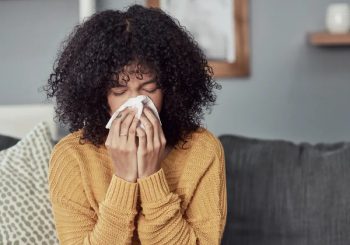By Sayer Ji
Contributing writer for Wake Up World
The common cold is just that — a standard ailment for many people when winter weather arrives. But that doesn’t make a cold any easier to deal with when it strikes. You’re likely to feel tired and achy, stuffed-up or tending to a runny nose. You may develop a sore throat and persistent cough. Each year, the common cold causes more missed school and work days than any other illness.[i]
[pro_ad_display_adzone id=”110028″]
Many types of viruses can bring on cold and flu symptoms, but colds and flu are not the same. Most colds are caused by rhinoviruses,[ii] whereas the flu can only be caused by an influenza virus.[iii] Both conditions share symptomology, but colds are generally minor and short-lived while influenza can be life-threatening with serious associated complications.[iv]
The common cold onsets gradually and rarely produces a high fever. If you have an abrupt onset of symptoms including fever, you may have something more serious and should consult your health care provider.[v] Common cold symptoms include:
- Minor aches and pains
- Sneezing
- Runny or stuffy nose
- Mild chest discomfort or cough
- Sore throat[vi]
To manage symptoms of a cold, and potentially boost your immunity to seasonal illness, we’ll provide basic prevention practices and share five top supplements that can be a smart part of your winter wellness strategy. Because if there’s anything better than safe, cost-effective cold treatments, it’s not catching a cold in the first place.
Keep Colds at Bay by Maintaining Healthy Habits
Preventing seasonal illness starts by washing your hands frequently and avoiding close contact with people who are sick. Disinfect shared surfaces that may harbor virus particles; research has shown that rhinoviruses can survive up to three hours outside of the nasal canal.[vii]
Plunging temps, shorter days and the demands of the holidays may make it challenging to keep up with your usual healthy routine. Do your best to maintain a healthy diet. Avoid excessive sugar intake and be moderate with alcohol and processed foods devoid of nutrients. Empty calories are behind much of the weight gain associated with the holidays.
Keep your stress in check by not over-committing yourself. Stress is one of the biggest threats to your immune system, making it important to maintain an exercise routine if you’re doing more than usual. Exercise relieves stress, produces “feel good” endorphins and will help offset extra calories and time spent indoors. Finally, don’t forget to pause during the winter months — traditionally, a time for hibernation — and mindfully unwind.
Reflective contemplation and meditative practices honor your body, mind and spirit, sending a signal of wellness to your entire body. Don’t let the cold winter weather be an excuse for neglecting your wellness routine. By practicing good health hygiene year-round, with added seasonal immunity support, you may get through cold and flu season without needing to take a sick day.
Five Tips to Relieve Cold Symptoms Naturally
If you do find yourself with a case of “the ick,” or if you feel a cold could be coming on, consider the following supplements that may work for treating the common cold.
1. Echinacea
There is a wealth of studies showing the benefits of the herb echinacea for treatment and prevention of the common cold. Extracts of the plant, for which there are nine known species, are commonly used in Europe for treating upper respiratory infections.[viii]
A meta-analysis of 16 randomized trials comparing echinacea extracts with placebo, no treatment or another treatment found that the majority of trials reported positive results compared to placebo.[ix]
Researchers acknowledged that differences in echinacea preparations made a comparative analysis difficult, but two of five trials showed a statistically significant lower incidence of infection in the echinacea treatment group, and another trial showed that the duration of colds was significantly shorter in the treatment group.[x]
A 2006 meta-analysis found that standardized echinacea extract was effective in cold prevention after clinical inoculation with rhinovirus.[xi] Inoculation-type trials provide researchers with a more homogenous sample group since exposure to the virus occurs at the same time for all participants. These and other clinical data suggest a strong protective effect from taking echinacea during cold and flu season.
2. Vitamin C
Vitamin C is well known for its health-boosting properties, and it’s especially important during cold and flu season. An extra dose of vitamin C taken daily at the start of a cold can help reduce its duration, according to a 2018 meta-analysis.[xii] This may be due to vitamin C’s critical link to immune system health.
Evidence shows several cells of the immune system can accumulate vitamin C, which is necessary for proper functioning of phagocytes and t-cells.[xiii] Vitamin C deficiency leads to reduced resistance to some pathogens, while a higher dose of C enhances several immune system markers.[xiv]
If you decide to get your vitamin C boost from a supplement, consider one with added zinc for seasonal immunity. Studies show that a combination supplement of vitamin C plus zinc is significantly more effective than placebo at reducing a cold over five days of treatment.[xv] Symptom relief was quicker with the combined supplement and there were no adverse effects.[xvi]
3. Elderberry
Upper respiratory discomfort often accompanies a common cold. From the “rattle” in your chest to persistent post-nasal drip and a sore, dry throat, effective treatments for cough can help prevent more serious problems from developing. Elderberries, the dark purple fruit of the elder tree, may be the ideal treatment to ease upper respiratory symptoms of viral infection thanks to their natural antibiotic properties.
Elderberries have a long history as a health aide, particularly for immuno-support. Elderberry health supplements are made from extracts of berries, and fresh fruits can be eaten if they are well-cooked. It’s not wise to consume leaves or stems of this plant, and raw or unripe fruit can lead to vomiting, nausea or diarrhea.
A 2019 meta-analysis of black elderberry supplementation found that it substantially reduced upper respiratory symptoms due to viral infections like the common cold and influenza.[xvii] The researchers recommended elderberry extract as an alternative to antibiotics, which are misused when prescribed for viruses like colds and flu.
Antibiotics are efficient at attacking bacterial infections, however they are not indicated for viral infections since antibiotics cannot penetrate virus cell walls.[xviii] According to the CDC, at least 30% of antibiotics prescribed in the U.S. are unnecessary.[xix]
4. Probiotics
You’re probably aware that probiotics help you maintain a healthy digestive environment. But did you know they may also prevent you from catching a cold when you’re stressed? Turns out, a healthy bacterial mix in your gut can be a potent virus-fighting strategy.
A double-blind, placebo-controlled study looked at the percentage of students who reported a sick day due to cold or flu while undergoing exam-related stress. Students were monitored on their proportion of healthy days over a six-week period. Researchers examined the protective effect of three probiotic bacterial strains — Lactobacillus helveticus, Bifidobacterium longum and Bifidobacterium bifidum — compared to placebo.
The probiotic strain B. bifidum produced the greatest benefit, resulting in more healthy days than placebo. This treatment group also reported a lower level of stress and more hours of sleep than other groups. Researchers concluded that daily intake of bifidobacteria provides benefit for cold symptoms and can help you stay healthy during stressful times.[xx]
5. Pelargonium sidoides (African geranium)
The most exotic supplement on our list is Pelargonium sidoides, commonly called African geranium. While you may not yet be familiar with this treatment, a quick internet search yields the herb’s key claim to fame — it’s a heralded natural cold remedy.
Long used in traditional medicine, the root of the plant is distilled into an extract that is used to treat symptoms of illness and promote fast healing. In many countries, Pelargonium sidoides is the go-to remedy for bronchitis as well as the common cold. African geranium’s therapeutic properties include antiviral and antibacterial effects, as well as stimulating natural immunity to illness.[xxi]
A 2017 phase-3 clinical trial examined Pelargonium sidoides as a non-antibiotic therapeutic for the common cold. A total of 207 adults were given treatment with 60 drops of African geranium extract three times daily for 10 days, while the control group received a placebo. Cold intensity was measured over the course of treatment.
Results showed that from baseline to day five, cold intensity scores decreased by nearly twice as much for the treatment group compared to the control group (-11.2 points versus -6.3 points).[xxii] Remarkably, after the 10th day, 90.4% of the treatment group was clinically cured, while only 21.2% of the control group was cured.[xxiii]
Additionally, participants in the treatment group reported significantly less inability to work than the control group, and a greater proportion of treatment group patients reported a complete recovery or major improvement at day five.[xxiv] Overall, researchers reported that African geranium was an effective, well tolerated, safe treatment that significantly reduces the severity of symptoms and shortens the duration of the common cold.[xxv]
To learn more about treating and preventing seasonal illness, consult GreenMedInfo.com, the world’s most widely referenced, evidence-based natural medical resource.
Sources and References:
- [i] Johns Hopkins Medicine, Health, Conditions and Diseases, Common Cold, https://www.hopkinsmedicine.org/health/conditions-and-diseases/common-cold. Accessed 15 Dec 2021.
- [ii] Johns Hopkins Medicine, Health, Conditions and Diseases, Common Cold, https://www.hopkinsmedicine.org/health/conditions-and-diseases/common-cold. Accessed 15 Dec 2021.
- [iii] CDC.gov, Influenza (Flu), https://www.cdc.gov/flu/symptoms/coldflu.htm. Accessed 15 Dec 2021.
- [iv] CDC.gov, Influenza (Flu), https://www.cdc.gov/flu/symptoms/coldflu.htm. Accessed 15 Dec 2021.
- [v] CDC.gov, Influenza (Flu), https://www.cdc.gov/flu/symptoms/coldflu.htm. Accessed 15 Dec 2021.
- [vi] CDC.gov, Influenza (Flu), https://www.cdc.gov/flu/symptoms/coldflu.htm. Accessed 15 Dec 2021.
- [vii] Johns Hopkins Medicine, Health, Conditions and Diseases, Common Cold, https://www.hopkinsmedicine.org/health/conditions-and-diseases/common-cold. Accessed 15 Dec 2021.
- [viii] Cochrane Database Syst Rev. 2000;(2):CD000530. doi: 10.1002/14651858.CD000530. Update in: Cochrane Database Syst Rev. 2006;(1):CD000530. PMID: 10796553. https://pubmed.ncbi.nlm.nih.gov/10796553/
- [ix] Cochrane Database Syst Rev. 2000;(2):CD000530. doi: 10.1002/14651858.CD000530. PMID: 10796553. https://pubmed.ncbi.nlm.nih.gov/10796553/
- [x] Cochrane Database Syst Rev. 2000;(2):CD000530. doi: 10.1002/14651858.CD000530. Update in: Cochrane Database Syst Rev. 2006;(1):CD000530. PMID: 10796553. https://pubmed.ncbi.nlm.nih.gov/10796553/
- [xi] Clin Ther. 2006 Feb;28(2):174-83. doi: 10.1016/j.clinthera.2006.02.001. PMID: 16678640. https://pubmed.ncbi.nlm.nih.gov/16678640/
- [xii] Biomed Res Int. 2018 ;2018:1837634. Epub 2018 Jul 5. PMID: 30069463. https://pubmed.ncbi.nlm.nih.gov/30069463/
- [xiii] Med Monatsschr Pharm. 2009 Feb;32(2):49-54; quiz 55-6. German. PMID: 19263912. https://pubmed.ncbi.nlm.nih.gov/19263912/
- [xiv] Med Monatsschr Pharm. 2009 Feb;32(2):49-54; quiz 55-6. German. PMID: 19263912. https://pubmed.ncbi.nlm.nih.gov/19263912/
- [xv] J Int Med Res. 2012;40(1):28-42. doi: 10.1177/147323001204000104. PMID: 22429343. https://pubmed.ncbi.nlm.nih.gov/22429343/
- [xvi] J Int Med Res. 2012;40(1):28-42. doi: 10.1177/147323001204000104. PMID: 22429343. https://pubmed.ncbi.nlm.nih.gov/22429343/
- [xvii] Complement Ther Med. 2019 Feb;42:361-365. doi: 10.1016/j.ctim.2018.12.004. Epub 2018 Dec 18. PMID: 30670267. https://pubmed.ncbi.nlm.nih.gov/30670267/
- [xviii] Queensland Government, Queensland Health, Why antibiotics can’t be used to treat your cold or flu, https://www.health.qld.gov.au/news-events/news/antibiotics-viruses-cold-flu. Accessed 16 Dec 2021.
- [xix] CDC.gov, Media, Releases, 2016, 1 in 3 antibiotic prescriptions unnecessary, https://web.archive.org/web/20230930163533/https://www.cdc.gov/media/releases/2016/p0503-unnecessary-prescriptions.html. Accessed 17 Dec 2021.
- [xx] Br J Nutr. 2015 Feb 14;113(3):426-34. doi: 10.1017/S0007114514003997. Epub 2015 Jan 21. PMID: 25604727. https://pubmed.ncbi.nlm.nih.gov/25604727/
- [xxi] Memorial Sloan Kettering Cancer Center, Cancer Care, Integrative Medicine, Herbs, Pelargonium sidoides, https://www.mskcc.org/cancer-care/integrative-medicine/herbs/pelargonium-sidoides. Accessed 17 Dec 2021.
- [xxii] Altern Ther Health Med. 2018 Mar;24(2):16-26. PMID: 29055287. https://pubmed.ncbi.nlm.nih.gov/29055287/
- [xxiii] Altern Ther Health Med. 2018 Mar;24(2):16-26. PMID: 29055287. https://pubmed.ncbi.nlm.nih.gov/29055287/
- [xxiv] Altern Ther Health Med. 2018 Mar;24(2):16-26. PMID: 29055287. https://pubmed.ncbi.nlm.nih.gov/29055287/
- [xxv] Altern Ther Health Med. 2018 Mar;24(2):16-26. PMID: 29055287. https://pubmed.ncbi.nlm.nih.gov/29055287/
Recommended Articles by Sayer Ji:
- The Power and Mystery of Melanin Explained
- Cell Phone Induced Bodily Harm: How the Bees Can Help
- The Spice That Prevents Fluoride Destroying Your Brain
- How to Clean Your Arteries with One Simple Fruit
- 7 Healing Uses for Lavender Essential Oil
- From Table to Tomb: Cumin’s Health Benefits Rediscovered
- Why You Should Ditch Sugar in Favour of Honey
- The Love Affair Between Saffron and Humanity: As Ancient as Time Itself
- Why Walnut Resembles the Brain It Nourishes
- Magnesium Puts Psychiatric Drugs to Shame for Depression
About the author:
Sayer Ji is the founder of Greenmedinfo.com, a reviewer at the International Journal of Human Nutrition and Functional Medicine, Co-founder and CEO of Systome Biomed, Vice Chairman of the Board of the National Health Federation, and Steering Committee Member of the Global Non-GMO Foundation.
© 2020 GreenMedInfo LLC. This work is reproduced and distributed with the permission of GreenMedInfo LLC. Want to learn more from GreenMedInfo? Sign up for their newsletter here.
[pro_ad_display_adzone id=”110027″]








